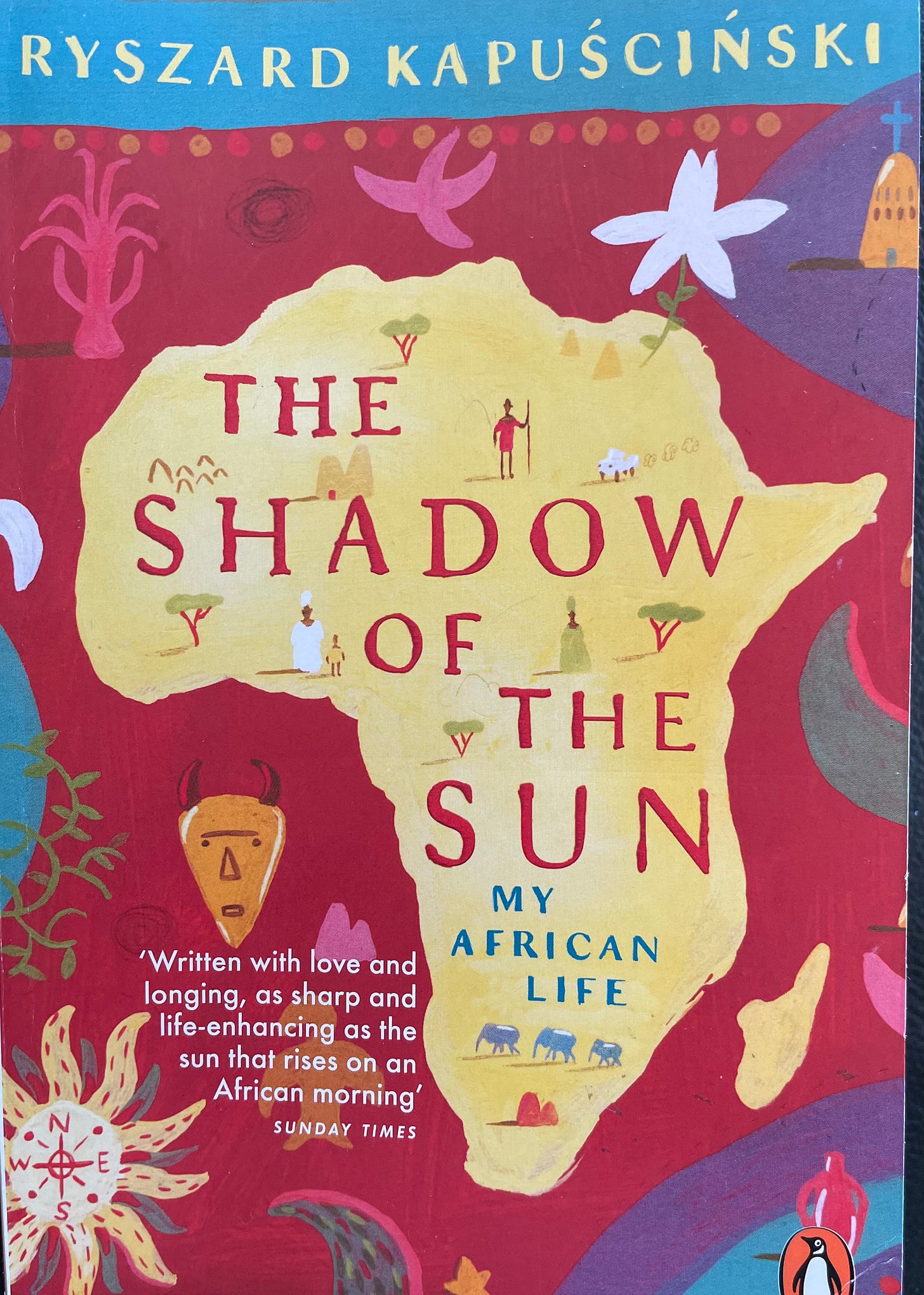UNDER THE AFRICAN SUN
This late Polish writer is thought to have crossed the line from journalism into fiction. Now I wish to read all his work.
Books have a way of discovering me. The Shadow Of The Sun: My Africa Life, by Polish writer Ryszard Kapuściński, found me on the very day I stepped into Littered With Books, a shop I never revisited after that one afternoon early on in my six-month stay in Singapore. It’s unfortunate that translated books by such enormously talented writers don’t seem to appear often enough on American bookshelves.
Kapuściński was a celebrated Polish writer once poised to receive the Nobel prize for literature. Posthumously, too, he has remained on people’s minds, allegedly for crossing the line between journalism and literature. Literary reportage does not mean that a writer can fudge facts. The controversy surrounding the body of Kapuściński’s work is articulated in a 2012 New York Times story titled More Than One Kind Of Truth In Journalism. If he were measured against the standards of the present day—when Google, the phone and the social media can easily call someone’s bluff—it’s possible his books may not have passed the test for journalistic integrity.
Still, I wish to talk about something that we so often forget during our engagement with or analysis of someone’s work. We forget that a story can seem porous with respect to dates and events but actually hold its own when examined for the larger truth.

Kapuściński is the second Polish writer whose work I’ve read (after Stanislaw Lem). Well before even finishing The Shadow Of The Sun, I fell in love with his artful narration and his sensitive, incisive pen. Read Kapuściński to know how night arrives in Africa. To know how Malaria whittles down a healthy human into a sniveling, sweaty shadow of himself, read Kapuściński. Above all, read Kapuściński to know what time can mean to different organisms around the universe. Europeans, he says, are enslaved by it. Africans, on the other hand, stretch time. Time is a slave to them.
Some chapters in The Shadow Of The Sun were difficult to read. Many parts of Africa, that varied continent 3.07 times bigger than the continental United States, are crushingly poor because vast swathes of the continent have been ravaged by nature, the sun or by the cruelty of man.
The book was a nostalgic trip through East Africa and hence it felt unexpectedly personal for me. Kapuściński describes Dar-es-Salaam at length and talks about Indians and their weekend entertainment by the sea. Every Sunday, for six years of my stay in Dar, I walked up and down Ocean Road inhaling the breeze from the Indian ocean as well as the vanities of the local Indians preening in their weekend best.
Kapuściński really understands Africa and hence this is an honest book. The Shadow Of The Sun is a look at forty years in Africa after the writer retired. Perhaps it may not always be accurate according to the rubric of a professional fact-checker but during my read, I recognized the myriad emotional truths packed into this exquisite collection of essays, especially after my own travels in Tanzania, Kenya, Madagascar, Seychelles, Mauritius, Egypt and Tunisia.
Kapuściński’s love for Africa allows him to see the predatorial instincts of the white man, himself included. The depredation of Africa and other parts of the world by the colonial powers, the promise of freedom, the ultimate mismanagement by those who won the freedom and the disillusionment of the masses is the story in almost every country—Ghana, Nigeria, Mauritania, Zambia, Ethiopia and many others. What made this book memorable was the storytelling. Each chapter is a standalone piece, its narration suspenseful enough to keep me reading at the oddest hours.
Sometimes it was hard to continue reading, especially when a breathtaking scene was sullied by a glimpse of misery. I wanted to look away. The description of how drought and famine had overtaken several parts of Ethiopia was heartbreaking. Roads were littered with skeletons of animals—this was a painful reminder of a previous post of mine on U. R. Ananthamurthy’s Bara—and both the writer and the reader encounter teeming hungry masses in the dramatic mountain churches of Lalibela. Beggars moving in a pack stood by the church, “dozens of arms stretched upward like tentacles, and, where there were no limbs, innumerable gaping mouths extended upward, waiting for something to be thrown into them.”
Throughout I was in awe of the delicate yet powerful translation by Klara Glowczewska. I could not, however, locate Glowczewska’s name on the stunning front cover, on the back cover, or on the spine, or on any of the four opening pages. I did find it on page five. There it was, below the name of the book and the author: “Translated from the Polish by Klara Glowczewska”. I was disappointed. A translation is not a mechanical process. It’s not a word by word transformation of a work. When we read a translation we’re reading the distilled outpouring of two creative minds.
“It doesn’t mean you’re not reading the author. It means you are reading the product of two authors: the original author and the translator, who has to read the text, interpret it, and regenerate it in terms that make linguistic sense.” ~Paul Hond, The Peculiar Perils of Literary Translation, Columbia Magazine.
What astonished me in all the book review blurbs in The Shadow of The Sun was that the plaudits never once mentioned the name or the artistry of Klara Glowczewska. I believe that the imagination of the translator dances in the spaces between the languages and evokes a smile or a tear in the reader. Surely the name of a gifted translator deserves more than a perfunctory mention in a translation?







I've not heard of Ryszard Kapuściński, but he does sound interesting. I must admit I am a bit wary about reading work labeled as factual when it might be more allegorical. It is important to get that initial frame of reference right. It's a really good point about the often-unrated importance of the translator. They can make a work come to life, or they can bury it! BTW, the Santa Clara County Library has many of his works.
I have long admired Kapuscinki's writing! I first encountered him in a New Yorker article, in which he wrote about his very first trip abroad - to India! What a wonderful read that was! That prompted me to read his Travels with Herodotus, about his travels around the word. There are twin strands of translation involved here: he reads Herodotus in translation, and we, his English readers, read him in translation, magical alchemy that unveils such a marvelous universe of places and experiences.